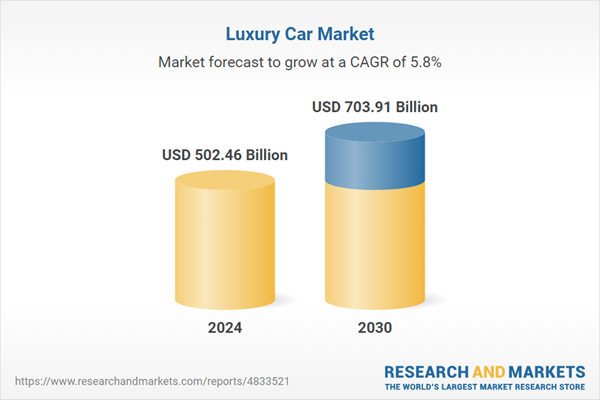Speak directly to the analyst to clarify any post sales queries you may have.
10% Free customizationThis report comes with 10% free customization, enabling you to add data that meets your specific business needs.
Key Market Drivers
Technological Sophistication as a Status Symbol
Today’s luxury car buyers prioritize technology as a key indicator of prestige, favoring vehicles equipped with advanced driver-assistance systems, AI-enabled infotainment, and autonomous driving capabilities. These features enhance comfort and safety while also reinforcing brand image. Automakers are heavily investing in machine learning, augmented reality, real-time analytics, and seamless connectivity to elevate the in-car experience. Features such as voice-controlled digital assistants, biometric access, and smartphone integration have become essential in the luxury segment. Additionally, over-the-air updates help keep vehicles current post-purchase, boosting brand loyalty and enhancing perceived value. As consumers become increasingly tech-driven, brand innovation and digital sophistication have emerged as central drivers of market growth.Key Market Challenges
High Cost of Innovation and Product Development
The pursuit of innovation in the luxury car market demands continuous and costly investments in R&D, advanced materials, and proprietary technologies. Integrating intelligent systems, autonomous functions, and sustainable solutions significantly increases development and production costs. With lower production volumes compared to mass-market vehicles, recovering these costs per unit is more challenging. Moreover, rapid technological shifts and changing consumer trends heighten the risk of low returns on investment. Stricter safety and environmental regulations also add complexity to the development process, often leading to delays and cost overruns. For both established manufacturers and new entrants, managing the financial strain of constant innovation while maintaining pricing competitiveness is a key obstacle to sustained growth.Key Market Trends
Integration of Ultra-Personalized In-Vehicle Experiences
Luxury car buyers are increasingly seeking vehicles that adapt to their individual preferences and digital lifestyles. As a result, ultra-personalized in-car experiences are becoming a key trend. Vehicles now feature AI-driven personalization, including mood-based ambient lighting, behavior-based climate and audio control, and voice-activated digital assistants. Customizable dashboards, biometric recognition, and connected services that sync with calendars and smart home systems are redefining the luxury driving experience. These enhancements turn the vehicle into an extension of the user’s digital ecosystem, fostering deeper engagement and brand loyalty. As artificial intelligence continues to advance, real-time, predictive personalization is expected to become a major differentiator in the luxury automotive market.Key Market Players
- BMW Group
- Mercedes-Benz AG
- General Motors Holdings LLC
- Toyota Motor Corporation
- Volkswagen AG
- Audi AG
- Rolls-Royce Motor Car
- Dr. Ing. h.c. F. Porsche AG
- Tata Motors Limited
- Tesla Inc.
Report Scope:
In this report, the Global Luxury Car Market has been segmented into the following categories, in addition to the industry trends which have also been detailed below:Luxury Car Market, By Vehicle Type:
- Hatchback
- Sedan
- SUV/Crossover
Luxury Car Market, By Propulsion Type:
- ICE
- Electric
Luxury Car Market, By Engine Capacity:
- < 2500cc
- 2500-5000cc
- >5000cc
Luxury Car Market, By Region:
- North America
- United States
- Canada
- Mexico
- Europe & CIS
- Germany
- France
- U.K.
- Spain
- Italy
- Asia-Pacific
- China
- Japan
- Australia
- India
- South Korea
- Middle East & Africa
- South Africa
- Saudi Arabia
- UAE
- Turkey
- South America
- Brazil
- Argentina
Competitive Landscape
Company Profiles: Detailed analysis of the major companies present in the global Luxury Car Market.Available Customizations:
With the given market data, the publisher offers customizations according to the company’s specific needs. The following customization options are available for the report.Company Information
- Detailed analysis and profiling of additional market players (up to five).
This product will be delivered within 1-3 business days.
Table of Contents
Companies Mentioned
- BMW Group
- Mercedes-Benz AG
- General Motors Holdings LLC
- Toyota Motor Corporation
- Volkswagen AG
- Audi AG
- Rolls-Royce Motor Car
- Dr. Ing. h.c. F. Porsche AG
- Tata Motors Limited
- Tesla Inc.
Table Information
| Report Attribute | Details |
|---|---|
| No. of Pages | 185 |
| Published | June 2025 |
| Forecast Period | 2024 - 2030 |
| Estimated Market Value ( USD | $ 502.46 Billion |
| Forecasted Market Value ( USD | $ 703.91 Billion |
| Compound Annual Growth Rate | 5.7% |
| Regions Covered | Global |
| No. of Companies Mentioned | 10 |









